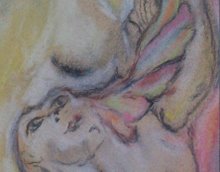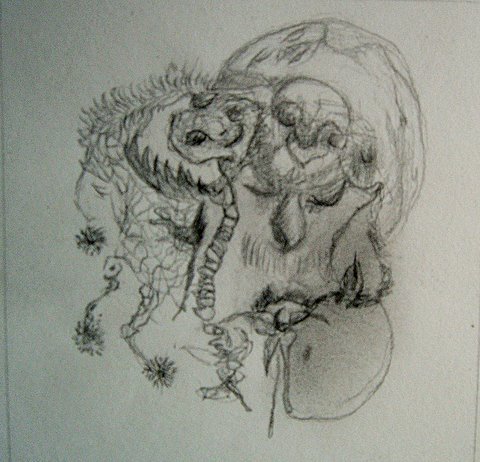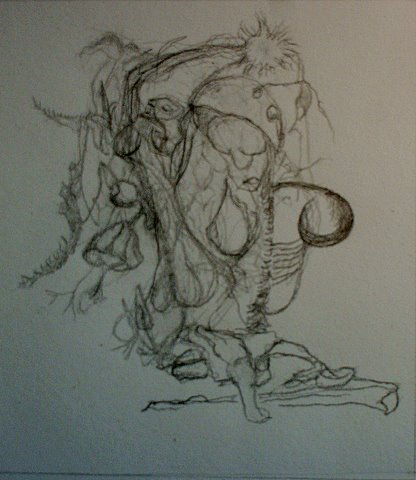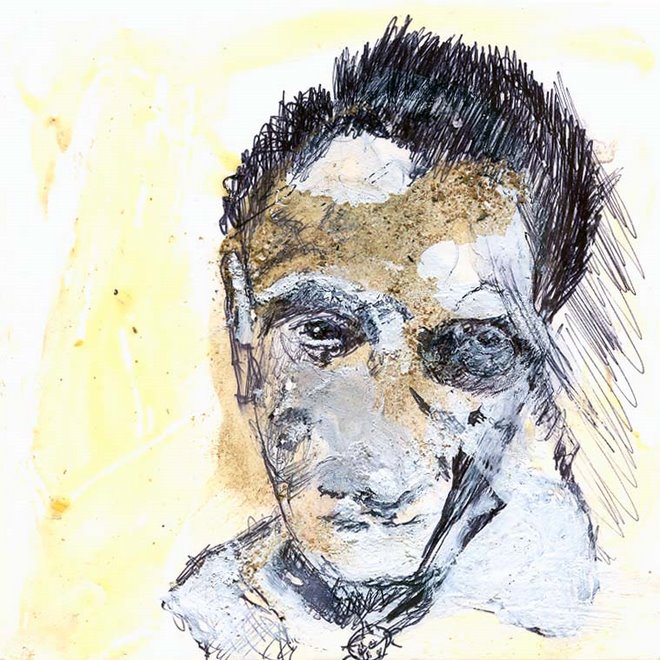Apropos a certain well-known author's (and former FB contact's) adverse reaction to the view that Michaux never really did a heroic dose, nor ever had any really profound "trip" that would constitute visionary experience -- & that maybe the microdosing Cartesian control freaking artist Michaux only dabbled, overly concerned with potential madness, worried about his ego retention, rather than finding the fourfold of Blake, prefered to tease and to tantalize his own intellect and entertain the paranoiac Western bias that insists on industrial and technological control of the free winds of consciousness ---- long breath pause------ I found this rather conducive and fair minded account (link below) of the psychonautical crisis in hypercapitalistic anthropocene to be quite relatable.
Very
sorry Mister David Toop, I have admired some of your rambulous scripsi but
this time you stumbled into a puzzling dismissive and thoughtless arrogance which I had imagined you were capable of -- a reflective incapacity that seems quite out of character politique or maybe we got played by the algobots --- but you deleted my (much milder) comments and blocked me on FB, wow....
"Michaux speculates about a strongly hierarchized technocratic political future in which psychedelics will have become part of the curriculum for training an elite destined to govern by moving the masses with carefully administered doses of charisma.
"How can this distinctly authoritarian vision of the future be reconciled with my earlier claim that Michaux's drug writing inaugurates a “molecular” conception of politics according to which psychedelics tend to undo organized political authoritarianism? Like many artists and intellectuals preoccupied with their own creative activities, Michaux had what might be described as solipsistic or even, in his case, autistic tendencies: “Evil is other people's rhythm,” he wrote in 1949 (Michaux, 2001; p. 342, italics original). When he imagines the possible advantage which psychedelics might give to the leaders of a hierarchical technocratic state of the future, he, like some of today's oligarchs, pharma entrepreneurs, and “psychedelic pundits” (Devenot et al., 2022) and some of their critics, does not pause to consider that others with very different political viewpoints starting from much less privileged positions could also enjoy a similar benefit but to different ends. He does not imagine, but his readers can, the effect of such a boost in political self-belief on the undermotivated and quietly despairing multitudes who might lack the basic self-esteem and self-confidence which, according to philosopher Axel Honneth's recognitive account of autonomy, for example, are essential proto-political conditions for the exercise of this and other aspects of political agency: “molecular” conditions, even though Honneth does not use this term (Honneth and Anderson, 2005). There is good reason to believe that without quite being above the threshold at which they might be diagnosed as clinically depressed, a sizeable proportion of the world's downtrodden lack the motivational means and self-belief to engage in projects of individual or collective transformation: they are held captive by their situation, beaten down by economic hardship and social deprivation, caught up in flows of information, “guidance,” and “entertainment.” Reading against its grain, from the perspectives of radical democracy and recognitive theory outlined here, perforce briefly, Michaux's anticipation of a psychedelically assisted technocratic future suggests that there would be a considerable transformative benefit in the psychedelically assisted self-raising of their self-esteem and motivation by a despondent global majority, indeed that this would in effect consolidate the force of their political will..."
"There
is one respect in which Michaux's drug works are politically
problematic: as mentioned (Section 1.1), their orientation is resolutely
toward Western technoscience and biomedicine and engages only very
fleetingly with indigenous cultural practices. In this one respect,
Michaux's approach is rather narrow and ignorant and I would not wish to
suggest otherwise, though at least he is transparent about this
orientation and, as the following section establishes, he is to some
extent consistent or evenhanded in the sense that Christian mystical
experience is also subordinated to scientific explanation and translated
into secular naturalistic terms. Had he been questioned on this point, I
can imagine him responding along these lines: however significant
indigenous practices may be, like it or not, Western technoscience is
now the hegemonic paradigm and unless indigenous experiences can be
translated into its terms they are destined to remain of largely
antiquarian interest. They can certainly be “recognized,” as many
scholars in the psychedelic humanities tirelessly demand, but whether
much follows concretely from earnestly felt rhetorical gestures in this
direction is a decidedly moot point. Of course, Michaux's approach
contrasts markedly with that of some scholars in the psychedelic
humanities, who wish to envision a future that “respects the lineages of
the knowledges that are essentially and not accidentally bundled with
these plants—Indigenous and counterculture wisdoms” (Devenot et al.,
2022). However, Michaux is less interested in “plant medicines” than in
synthetic chemical forms... "
After
getting through this study, even into the fine details of the
footnotes, I feel that the issues are divided along colonialist lines.
Western conquistadors learned about some plant medicines of which
indigenous people alone had gnosis. It still scares them that stuff
eaten direct from the jungle belly ombelicos makes you smarter more energetic and healthier than those lost
in the supermarket shopping. But the Europeans of the West are alone in
this amnesia about mycelial intelligence. All throughout Eastern Europe, the Steppes
and the Balkans the amanita wisdom is implicit. It does all depend on
trees having natural growth cycles of forests... and it depends on you being there as an intelligence among other intelligent beings -- animal and vegetal -- in process --
Michaux had a highly regulated and art intelligentsia approved experience and his books and drawings circulate in the bourgeois culture zones because it was all made palatable and mild mannered. Perhaps the cautionary tale of the Artaudian extreme precedes and conditions and curbs the enthusiasm. You can be a
"creative" person having anxious existential encounters on the buzzed out edge and the yet the salvific normalizing western ego comes back and makes every thing safe and cozy. It is only clinical microdose
experiment afterall not a the whole cloth experience of being taken to the
roots of phusis and bios and maybe encountering G-d or even a revolutionary encounter with the cloud of unknowing









No comments:
Post a Comment